Why Fiji is a top choice for scuba novices
If you’re ready to take the plunge on a diving course, this is the perfect place for beginners.
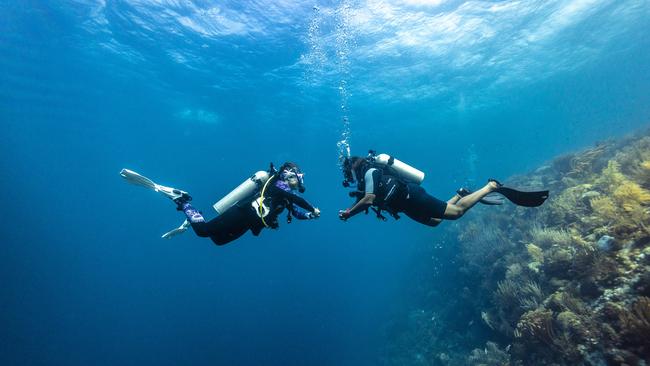
Why do you want to learn to dive?” The question is posed to me at Fiji’s Matamanoa Island Resort, home to Deep Blue, a PADI five-star dive centre. Feelings, many of them conflicting, are surging before my first ocean plunge. “I don’t know,” I say. “I’ve always been a very happy snorkeller.”
The truth is I’m also embracing a challenge that pushes me out of my midlife comfort zone. And I’m hoping the rewards are worth it, for it’s not a quick (or cheap) thing to qualify as an open-water scuba diver. There’s the online study and tests, which take up to 15 hours. Once you pass, there’s an extensive medical form. As I’m older than 45 and have had Covid-19, I need a doctor to confirm I’m fit to learn to dive. My GP is thrilled to have such an unusual consultation and reads out background information he probably should have kept to himself. “You don’t have a spouse you want to kill, do you?” he says.
Oh, there’s nothing like being reminded that adventure activities are sometimes deadly. My diving adventure starts feeling real when I head to a pool session with Sydney’s Dive Centre Bondi. There’s me and one other student with instructor Jadranka Nappi. After familiarising ourselves with the equipment, we clip on a weight belt and are helped into our buoyancy control devices (the vest) attached to an air tank and stagger to the pool’s edge. I feel like a turtle that has accidentally bought a mega-mansion. After a giant-stride entry into the pool, I’m much more buoyant.
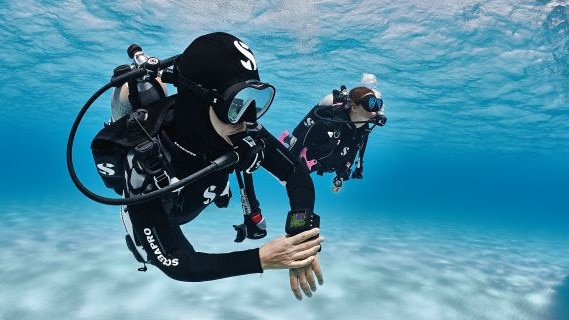
We take our first breath underwater and work through the practical skills. Certain phrases such as “never hold your breath” and “equalise (your ears) early and often” are drilled into us. What I don’t expect to stumble at is mask clearing, a manoeuvre in which you exhale sharply while tipping your mask slightly open to push out water that has crept inside. After water runs up my nose and down my throat while tipping my head, I panic and scramble to the surface twice before Nappi says: “You know you can just cough into your regulator, right?”
It’s handy advice for when I’m on my first dive near Matamanoa (a stone’s throw from Mana Island where the US Survivor series is filmed) in Fiji’s Mamanuca Islands. After another pool session to show instructor Eunice Valentine my competency, we head to the beginners’ dive site, Edenville. I giant-stride into choppy water, and out of nowhere, fear strikes at the thought of descending and leaving behind my known world.
Down below, it’s calm until I cough while mask clearing and spiral into alarm. Valentine materialises, using her huge brown eyes and hands to gesture that I should simply try again. Crisis resolved, she holds my hand as we complete our 39-minute dive to 12m.
Matamanoa is the perfect place for beginners, as Deep Blue eschews groups in favour of personalised diving (so much so that some guests return annually, not wanting to dive with anyone else) and provides access to several shallow dive sites. Experienced divers can clock up more PADI certifications or indulge passions such as underwater photography. The operation is run by English diving enthusiasts Trevor and Emma Neal (or Treva and Ema to use Fijian spelling). Trevor, a PADI course director (an elite group of instructor trainers), took to diving like a duck to water but Emma found it harder. “Emma understands the struggle whereas I don’t,” says Trevor, who teaches almost everything but draws the line at PADI’s mermaid course, in which swimmers learn to use a monofin.
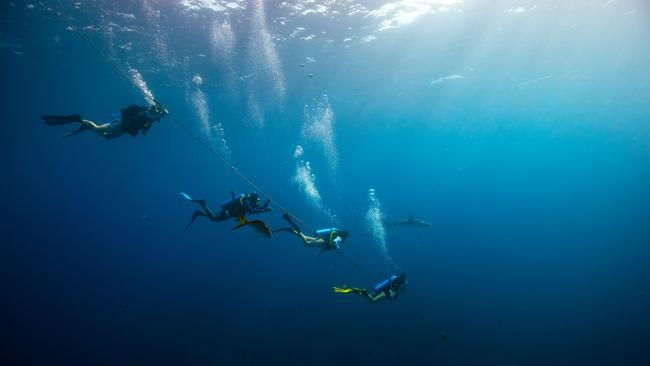
Emma says: “I was an advanced diver before I got it. I’d done 50 or 60 dives and was still frightened of water coming into my mask, frightened that everything’s going to kill me and eat me – then it just clicked on one dive and I thought, ‘I get it now.’ Everybody’s different. Some people are naturals; some people take a little bit longer. The important thing is to keep doing it.”
So I do, albeit with a break after my ear is affected on dive two, where we drifted past a lazing leopard shark. While my companions enjoy turtle encounters in the deep (damn), I discover the adults-only Matamanoa is a great place to do nothing. I’m in a beachfront bure with a plunge pool and day bed. I explore the compact island, passing the concrete pier where some guests chopper in from Nadi to skip overnighting on Denarau Island. I shoot the breeze with general manager Patrick Wong, a grandfather who started wearing his hair in braids when he couldn’t get a haircut during the pandemic. I clamber to the treehouse-like spa set higgledy-piggledy among foreshore foliage and take up an offer of a 10-minute free foot massage from a spa therapist near the pool.
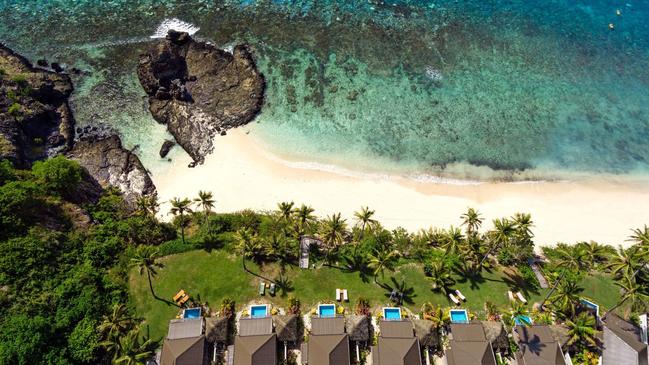
Another foot massage is offered when we arrive, via a 70-minute flight from Nadi, at the Jean-Michel Cousteau Resort at Savusavu on Vanua Levu, Fiji’s second-largest island. The nearby Namena Marine Reserve is the stuff of legend. It’s famous for soft corals and drift-diving, where you simply go with the flow and the dive boat retrieves you at the end.
Its biodiversity is astonishing, with hundreds of species of fish and coral, and dive sites with names just as colourful. I tick off Danny’s Dreadlocks, Shark Alley, Blue Ribbon Eel and Grand Central without further struggle. After completing the final skills required for my open water certification (allowing me to dive to 18m) and breaking through my anxiety barrier (around dive five when I no longer need my guide to watch me mask-clear), I finally relax and absorb the wonder of the lacelike sea fans, the cruising sharks, the lurid pink soft corals and tiny nudibranchs lurking in pinnacles that we circle around like a maypole.
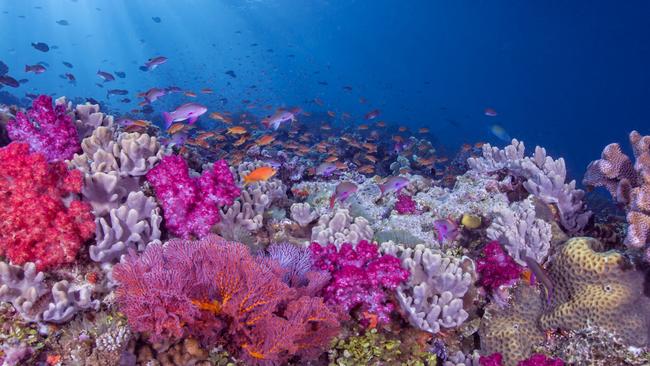
My favourite underwater memories are a moray eel with a body as thick as a human’s and seeing a squad of squid dangling behind our boat like delicate laundry pinned to a washing line.
A snorkeller simply wouldn’t see these sights. I’m reminded of the words of Jean-Michel’s papa Jacques, co-inventor of the first successful aqualung. Everything changed for him in 1936 when he waded into the Mediterranean wearing underwater goggles. “I put my eyes under again and civilisation vanished with one last bow,” he famously wrote in his 1953 book, The Silent World. “I was in a jungle never seen by those who floated on the opaque roof.” Now that I’ve peeked under the rafters, I understand the depth of his words.
Katrina Lobley was a guest of PADI and Tourism Fiji.
In the know
PADI, the Professional Association of Diving Instructors, has 6600 dive centres around the world that have collectively issued more than 29 million scuba-diving certifications.
Matamanoa Island Resort is home to 24 beachfront pool bures, 10 beachfront pool villas and 13 resort rooms. Bure rates, with breakfast, start from $FJ2100 ($1420) for two nights.
Bures, along with all meals and non-alcoholic drinks, childcare at The Bula Club and more, at Jean-Michel Cousteau Resort start from $FJ2110 a night.
Divers can inquire about dives, dive packages and PADI certification with Deep Blue (at Matamanoa and Denarau Marina) and at the Jean-Michel Cousteau Resort’s Cousteau Dive Centre.

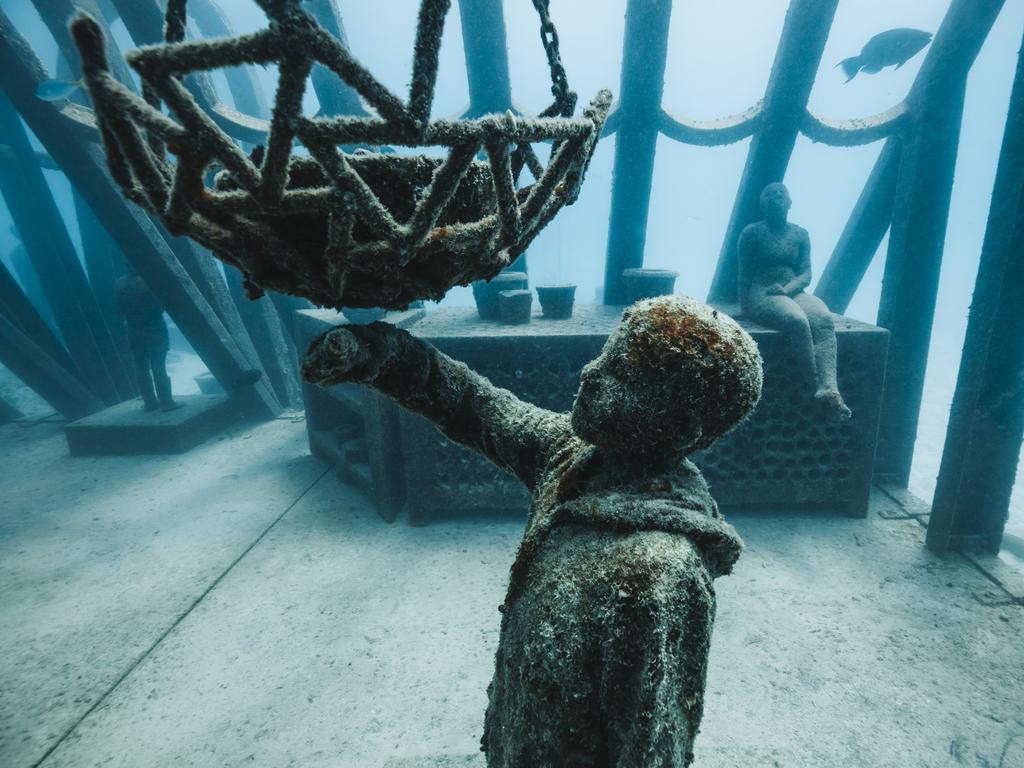
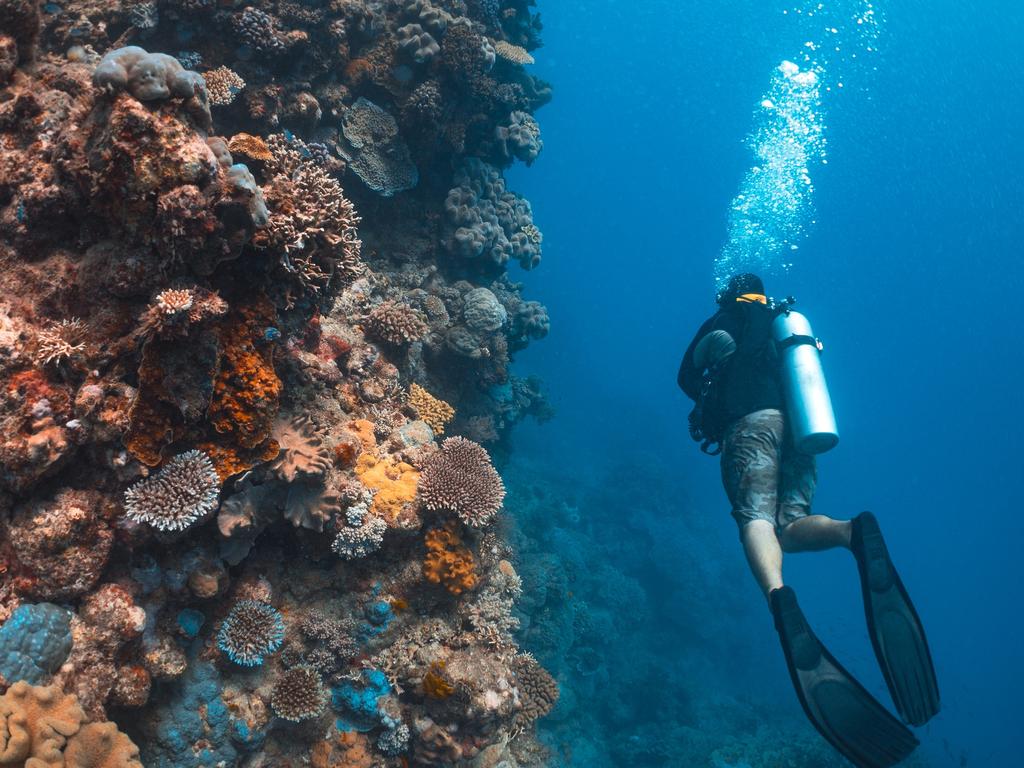


To join the conversation, please log in. Don't have an account? Register
Join the conversation, you are commenting as Logout